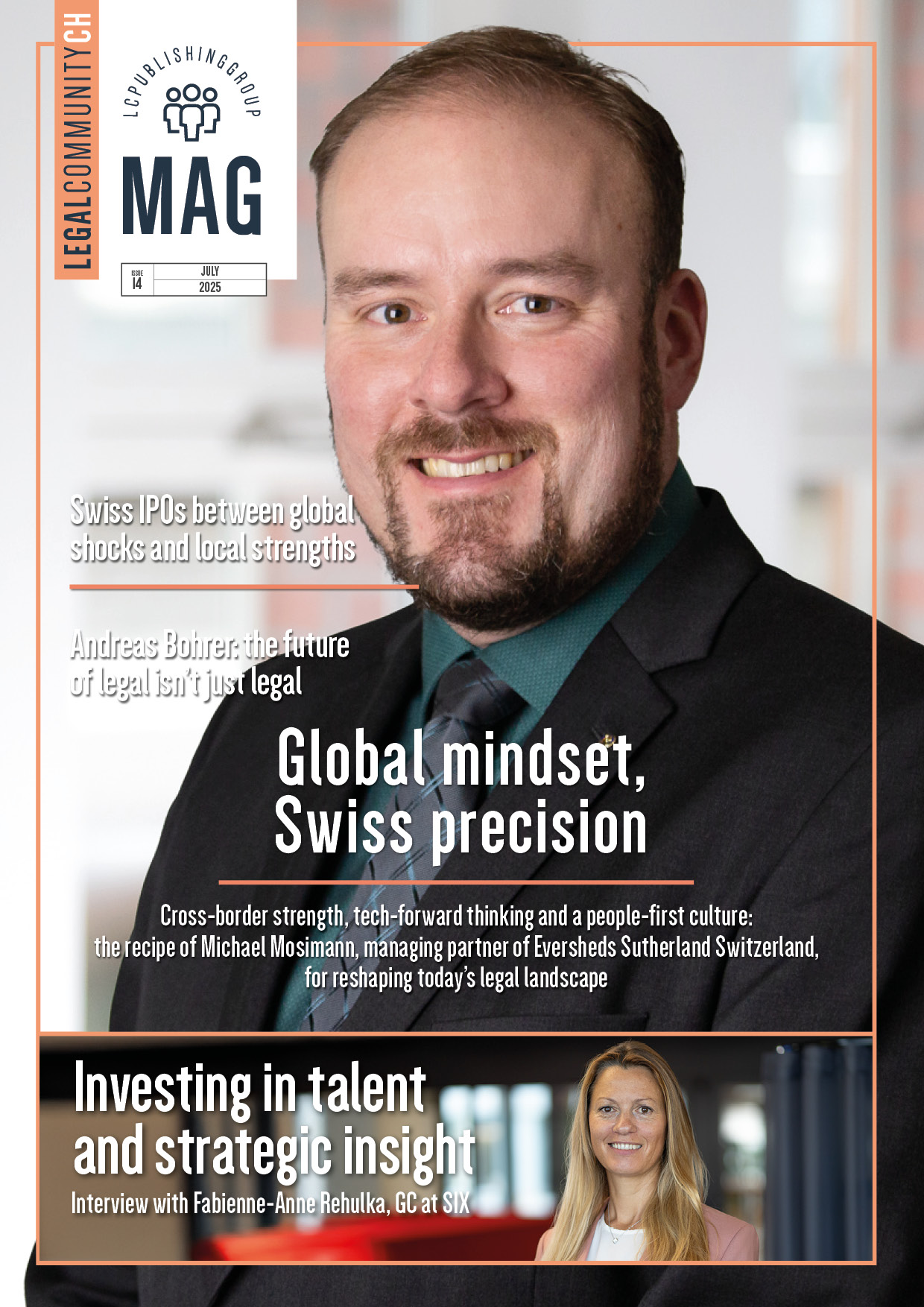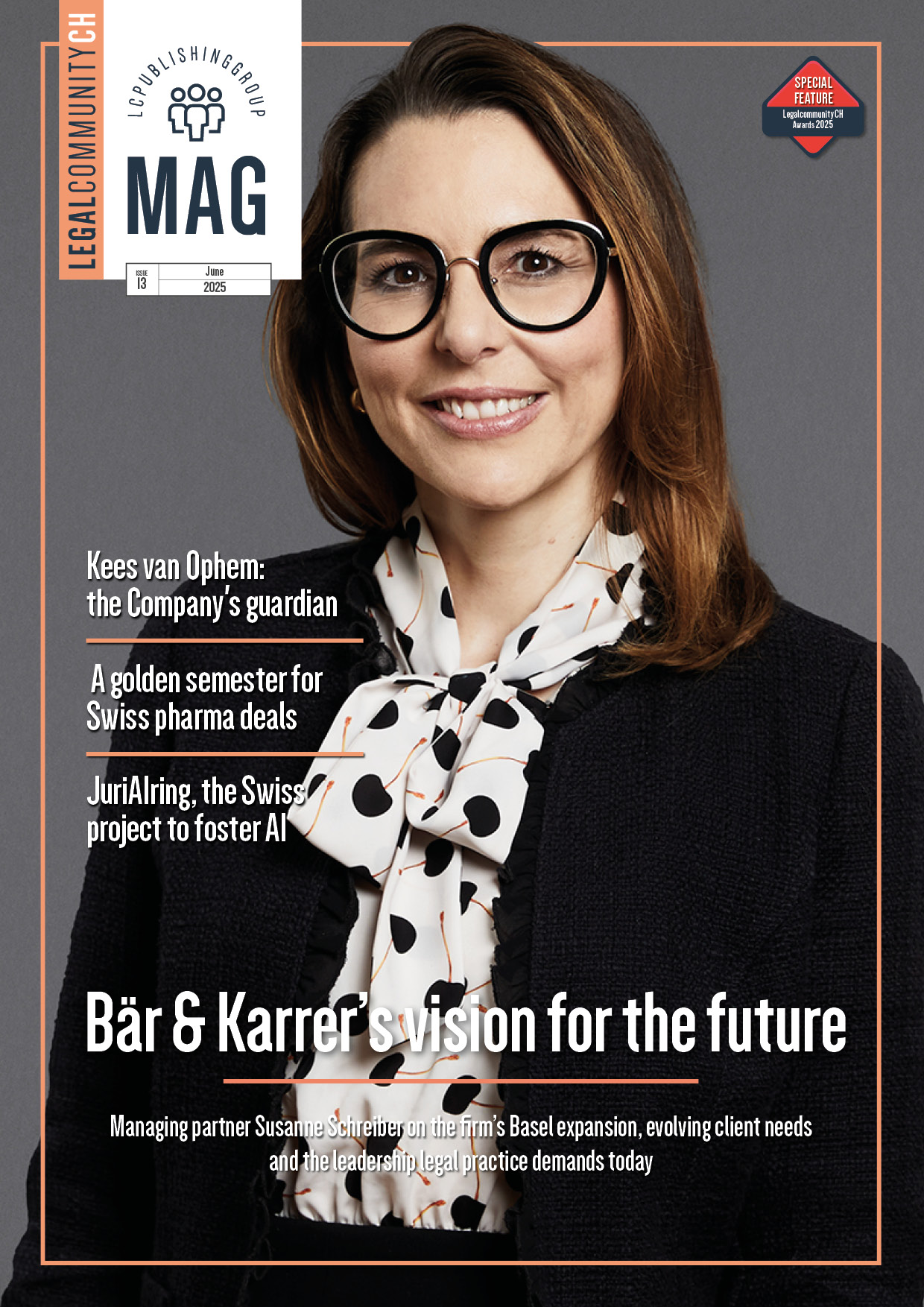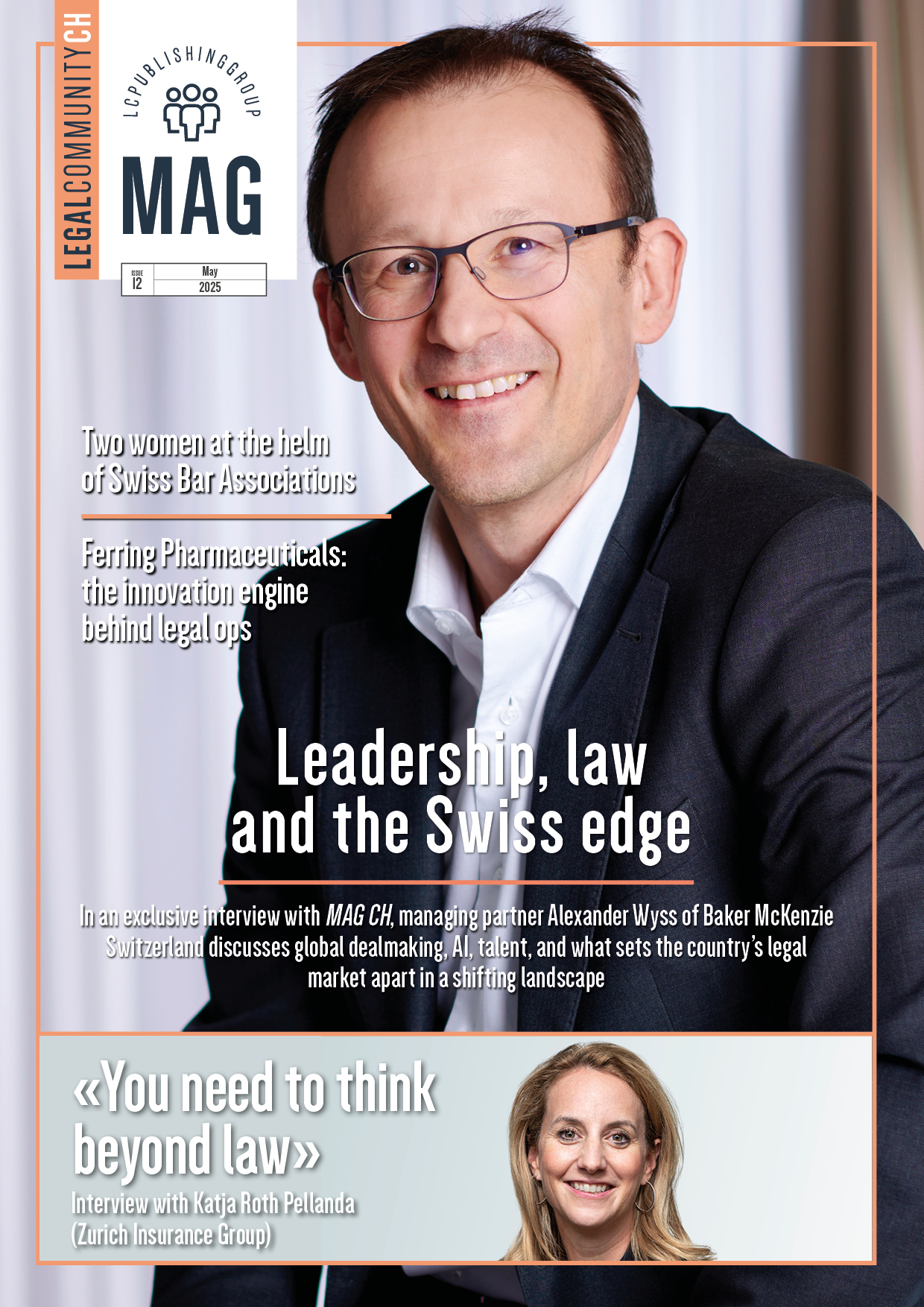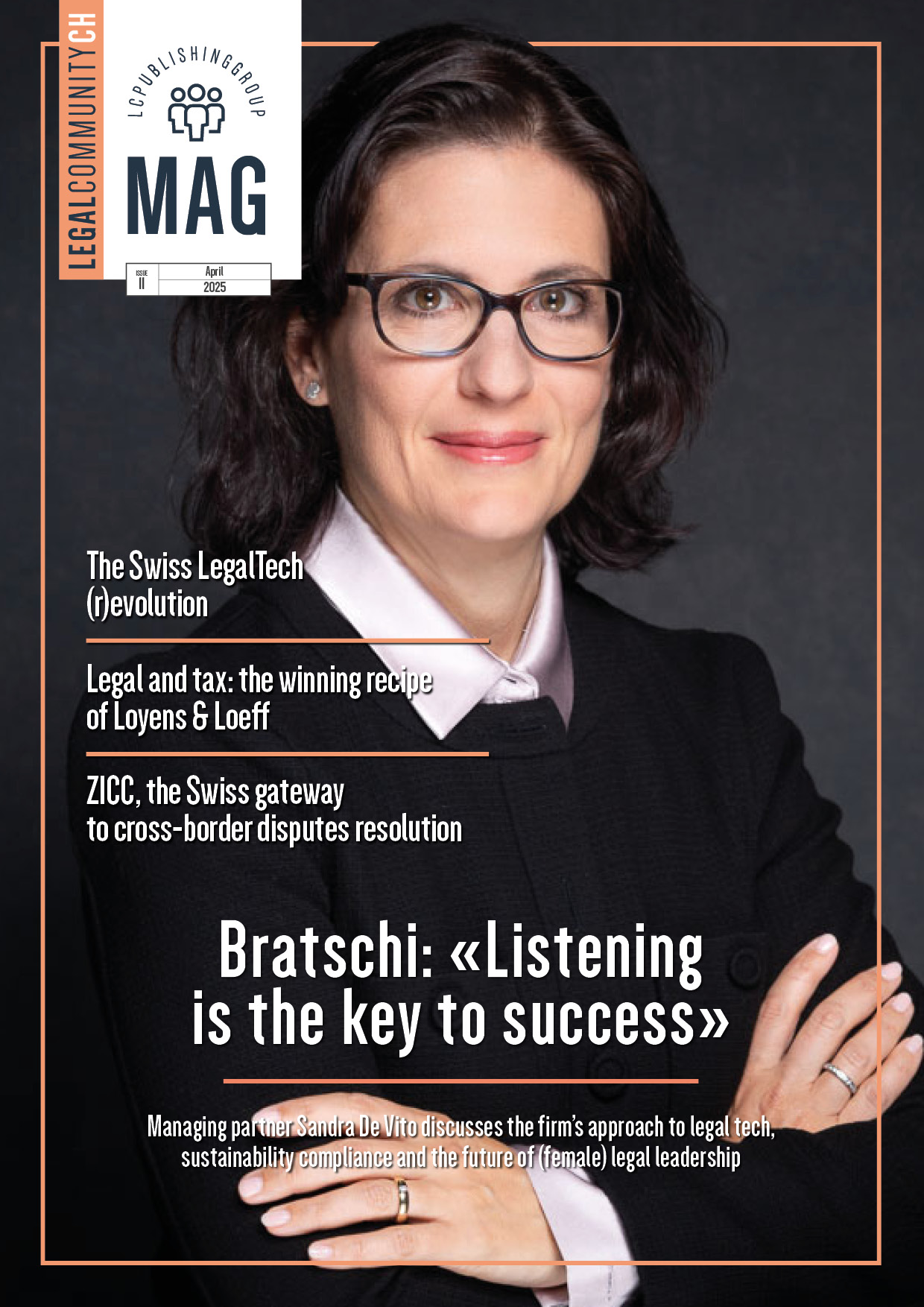Technology as a professional driver
Alessandro Celli, partner at Baker McKenzie Switzerland, speaks. “We have created a data-driven team.”
by giuseppe salemme
Alessandro Celli is a partner at Baker Mckenzie Switzerland and head of the Swiss Tmt practice group. He also leads the global fintech working group. MAG met him at the Spring Forum in Zurich, an event organized by the firm in March (the same occasion from which the interview with Richard Susskind published in last issue was taken). Swiss, but from an Italian father, Celli joined the firm as a lateral with a team in 2016, and since then he has been able to follow from a privileged perspective, especially because of his internationality, the dynamics of technological progress in recent years: from the development of the legaltech and fintech sectors, to the spread of the crypto phenomenon, passing through the cloud boom and arriving at the latest developments in artificial intelligence. In a chat with MAG in occasion of the Spring Forum, Celli had the opportunity to recount the firm’s work on these new fronts, as well as critically analyze the main challenges that increasingly fast technological development will bring to the attention not only of professionals, but of individual countries and society as a whole.
INSIDE THE FIRM
The development of the practices under his responsibility followed hand in hand with that of the reference technologies. The team, which combines legal expertise with IT expertise, «was born in a data-driven logic. Data management, data protection, data exploitation,» lists Celli, explaining the progressive structuring of the department. «Then it expanded to include skills both in cybersecurity and in the crypto and blockchain world: this is because dealing from the beginning with fintech and payment systems, it seemed natural to us to develop it in the contiguous sectors.» The strategic direction of the practice on a global level is entrusted to a working group of about 100 lawyers, many of which partners. «The group leads the firm in the strategic management of future tasks» Celli explains. An example of what this means is provided by the case concerning Ftx, the cryptocurrency exchange platform who declared bankruptcy last November: «We immediately created a dedicated sub-team to examine the prospects. It is essential to understand what to expect: litigation, of course, since about one million users were active on the platform. But financial institutions and advisors who advised those investments, or made them themselves, are also involved. So the group looks at the firm’s position, which of course depends on that of the clients being followed. And follows the unfolding of events: not only the purely judicial ones, but also all the related ones. I’m thinking, for example, of regulatory instances: if the crypto phenomenon is going to be regulated so that cases like the Ftx one don’t happen again, it is essential for us to enter into dialogue with the regulators, for example in Washington, to understand what the future will look like and to assist our clients proactively.»
In a more immediate perspective, Celli then describes the relationship the firm has with technology. Indeed, Baker Mckenzie, too, soon perceived how technology would offer lawyers new ways to practice: «In the late 2010s, having assisted many corporations in moving their infrastructure to the cloud made us realize that large law firms would sooner or later have to do the same: this was because the increased availability of data, and a
renewed ability to leverage it, would open the path to new, faster and increasingly capable applications.»
The firm has also seen this progression: from using software to automate searches and monitor proceedings, to adding solutions that enable automated actions on them. Up to the current frontier: «We are developing solutions that enable collaboration and brainstorming among lawyers: software that suggests a solution capable of including all the points of view expressed». It is indeed one of the main prerogatives of modern artificial intelligence systems, which are very capable (much more so than we humans) of handling large amounts of input and producing an output that leaves none out. And the firm is also investing globally in professionals who are capable to lead this process. In 2022, Cyrus Vance, a former Manhattan district attorney who built the cybersecurity infrastructure of the U.S. Department of Justice, arrived in the New York office. Two years earlier, in 2020, Paul Glass arrived in London to do the same in the UK.
OUTSIDE THE FIRM
Celli has all the air of being a keen observer and a sincere enthusiast not only of technology, but especially of the way it affects the world around us.
«The first wave of artificial intelligence dates back to the 1960s; the second to the 1990s. We are experiencing the third one, but it didn’t start now: this is just the moment when it became usable by the public,» Celli argues. Again, the reference is to the breakthrough that cloud technologies have enabled in data management and processing. «It is no coincidence that the so-called “big five” (Google, Amazon, Microsoft, Facebook and Apple), which alone make up a large part of the technology market, are also major players in the field of AI as well. It is the data they have that makes the difference,» he explains.
The European Commission is currently working on an “AI act” aimed at regulating the actions of AIs and protecting user data from indiscriminate use. Asked what is the most challenging aspect of drafting such legislation, Celli answers not so much as a lawyer but as someone trained in the humanities, «I think lawmakers should re-read philosophers first» he says, quoting what was told him by a colleague, who is a philosopher of law. «Philosophy is about realizing that the first thing that matters is to decide what we want to be and what we don’t,» he continues. «Currently there are three possible visions. The American one: which relies on the rules already in place, and which have allowed the big five to gain enough market power to acquire and integrate any startup that threatens their dominance. The Chinese one, which wants to be strongly independent of the American one, has developed in autonomy, but also exerts control over the population, to whose personal data it has extensive access. And in the middle there’s us Europeans: we usually look for a compromise solution, and in fact we often multitask big tech to enforce our rules in our countries. But I have the feeling that this time we should do a bit more like the Americans, and not over-regulate: because the risk is to be cut off from the market completely.»
Celli’s final thought, however, concerns the future of the profession: after all, he has just heard Richard Susskind talk about how lawyers have their hours counted and soon the entire system of justice and legal aid will be in the hands of formidable algorithms and the techno-legal figures capable of making them work. The lawyer partly agrees with the visionary professor’s remarks, but reflects, «I think of ancient Rome. I’m not sure that a person like Cicero would ever be replaceable by a machine. And I don’t think many of the talents we have now are.» And he equally warns of a danger that is little talked about but is already tangible today: a kind of hypertrophy of legal means. «The ability to generate legal texts in an automated way at little cost risks to provoke a disproportionate and senseless
increase in the quantity of acts, rules and documents,» warns Celli, who would like to preserve some principle of economy of legal activity. «Since I started doing this work, the amount of paperwork produced for every eventuality has already grown exponentially. It has become a habit, a standard: and the more this task is entrusted to machines, the worse the situation will be».
















